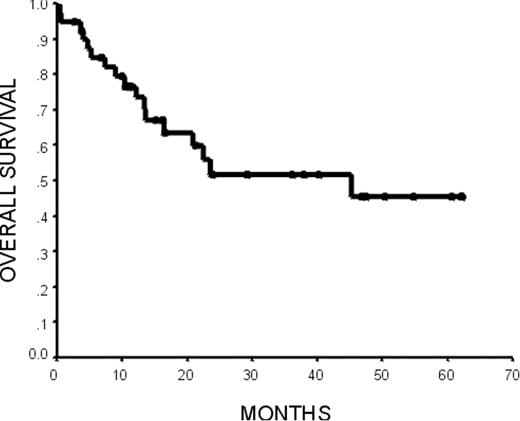Abstract
We report 41 consecutive patients with advanced chronic lymphocytic leukemia (CLL) who underwent allogeneic hematopoietic cell transplantation (HCT) following fludarabine, melphalan and alemtuzumab reduced intensity conditioning. Donors were 24 HLA-matched siblings and 17 unrelated volunteers (4 of them mismatched). Median age at transplant was 54 (range 37–67) years, interval from diagnosis to HCT was 54 (10–164) months, and number of previous chemotherapy regimens was 3 (1–6). Eleven patients were refractory to fludarabine at the time of transplant and 3 others (8%) had it stopped due to immune cytopenias. Eleven patients had failed autologous HCT. At the time of transplant, 7 patients (17%) had chemo-refractory and 34 (83%) chemo-sensitive disease, but only 5 (12%) were in complete remission.
All but 3 patients had initial hematological recovery, but 5 more patients had delayed graft failure that responded to subsequent stem-cell infusions. Median intervals to neutrophil (> 0.5 × 109/l) and platelet (> 20 × 109/l) recovery were 14 (range 9–30) and 11 (range 8–45) days, respectively. Eleven patients (27%) relapsed and received escalated donor lymphocyte infusions, but only 3 of them had a sustained response. Acute and chronic graft-versus-host disease (GVHD) was observed in 17 (41%) and 13 (33%) patients, respectively.
With a median follow-up of 15 (range 0.2–62) months, 17 patients have died, 5 of progressive disease and 12 of transplant-related complications. The 2-year overall survival, progression-free survival and transplant-related mortality are 51% (CI 33%–69%), 45% (27%–62%) and 26% (14%–46%), respectively (Figure 1). In multivariate analysis, fludarabine refractoriness prior to transplant was the only factor to predict a worse progression-free survival in this setting.
In conclusion, the alemtuzumab-based regimen was feasible and effective in patients with CLL with a relatively low rate of GVHD. However, transplant-related mortality remains relatively high as a result of a variety of viral and fungal infections. Ongoing studies are aiming to address the efficacy of reduced doses of alemtuzumab in this group of very immunosupressed patients.
Author notes
Corresponding author


